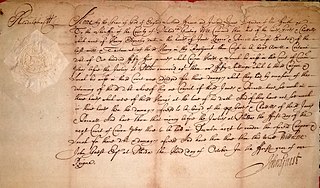De post disseisina (Law Latin, "of past disseisin") is a historical writ "for recovery of land by a person who had previously recovered the land from a disseisor by a praecipe quod reddat [a different type of writ) or on a default or reddition, but who was again disseised by the same disseisor." [1] A similar writ is de redisseisina. [2]
Habeas corpus is a recourse in law through which a person can report an unlawful detention or imprisonment to a court and request that the court order the custodian of the person, usually a prison official, to bring the prisoner to court, to determine whether the detention is lawful.

Black's Law Dictionary is the most widely used law dictionary in the United States. Henry Campbell Black (1860–1927) was the author of the first two editions of the dictionary.
Equity is a particular body of law that was developed in the English Court of Chancery. Its general purpose is to provide a remedy for situations where the law is not flexible enough for the usual court system to deliver a fair resolution to a case. The concept of equity is deeply intertwined with its historical origins in the common law system used in England. However, equity is in some ways a separate system from common law: it has its own established rules and principles, and is historically administered by separate courts, called "courts of equity" or "courts of chancery".
Plessy v. Ferguson, 163 U.S. 537 (1896), was a landmark decision of the United States Supreme Court in which the Court ruled that racial segregation laws did not violate the U.S. Constitution as long as the facilities for each race were equal in quality, a doctrine that came to be known as "separate but equal". The decision legitimized the many state laws re-establishing racial segregation that had been passed in the American South after the end of the Reconstruction era (1865–1877).
In law, certiorari is a court process to seek judicial review of a decision of a lower court or government agency. Certiorari comes from the name of an English prerogative writ, issued by a superior court to direct that the record of the lower court be sent to the superior court for review. The term is Latin for "to be made certain", and comes from the opening line of such writs, which traditionally began with the Latin words "Certiorari volumus...".

In common law, a writ is a formal written order issued by a body with administrative or judicial jurisdiction; in modern usage, this body is generally a court. Warrants, prerogative writs, subpoenas, and Certiorari are common types of writ, but many forms exist and have existed.
Adverse possession, sometimes colloquially described as "squatter's rights", is a legal principle in the Anglo-American common law under which a person who does not have legal title to a piece of property—usually land —may acquire legal ownership based on continuous possession or occupation of the property without the permission (licence) of its legal owner. The possession by a person is not adverse if they are in possession as a tenant or licensee of the legal owner.
A fieri facias, usually abbreviated fi. fa., is a writ of execution after judgment obtained in a legal action for debt or damages for the sheriff to levy on goods of the judgment debtor.
The Navy-Marine Corps Court of Criminal Appeals (NMCCA) is the intermediate appellate court for criminal convictions in the United States Navy and the Marine Corps.

In the United States military, the Army Court of Criminal Appeals (ACCA) is an appellate court that reviews certain court martial convictions of Army personnel.
In law, venire facias, also venire facias juratores, and often shortened to venire, is a writ directing a sheriff to assemble a jury. Various types are:
In English law, the assize of novel disseisin was an action to recover lands of which the plaintiff had been disseised, or dispossessed. It was one of the so-called "petty (possessory) assizes" established by Henry II in the wake of the Assize of Clarendon of 1166; and like the other two was only abolished in 1833.
At common law, ne exeat is an equitable writ restraining a person from leaving the jurisdiction of the court or the state. The writ may be issued to ensure the compliance by the defendant with a court order.
In English law, the assize of mort d'ancestor was an action brought where a plaintiff claimed the defendant had entered upon a freehold belonging to the plaintiff following the death of one of his relatives. The questions submitted to the jury were, "was A seised in his demesne as of fee on the day whereon he died?" and "Is the plaintiff his next heir?" This assize enabled the heir to obtain possession, even though some other person might have a better right to the land than the deceased.
Bailiff v. Tipping, 6 U.S. 406 (1805), was a United States Supreme Court case in which the Court held that a citation must accompany a writ of error in order for the court to hear the case.

The Writ De Excommunicato Capiendo Act 1562 was an Act of the Parliament of England.
Law Latin, sometimes written L.L. or L. Lat., and sometimes derisively called Dog Latin, is a form of Latin used in legal contexts. While some of the vocabulary does come from Latin, many of the words and much of the vocabulary stem from English. Law Latin may also be seen as consisting of a mixture of English, French and Latin words superimposed over an English syntax.
De parco fracto is a historical common-law writ against a person, often an owner, "who breaks into a pound to rescue animals that have been legally distrained and impounded."
The writ of estrepement, or de estrepamento, was a writ in common law countries that would be used to prevent estrepement, a type of 'voluntary waste'. The waste that the writ would issue to prevent would be waste that occurred in response to a lawsuit seeking possession of the land, or a judgment against the waster where possession had not yet been delivered.